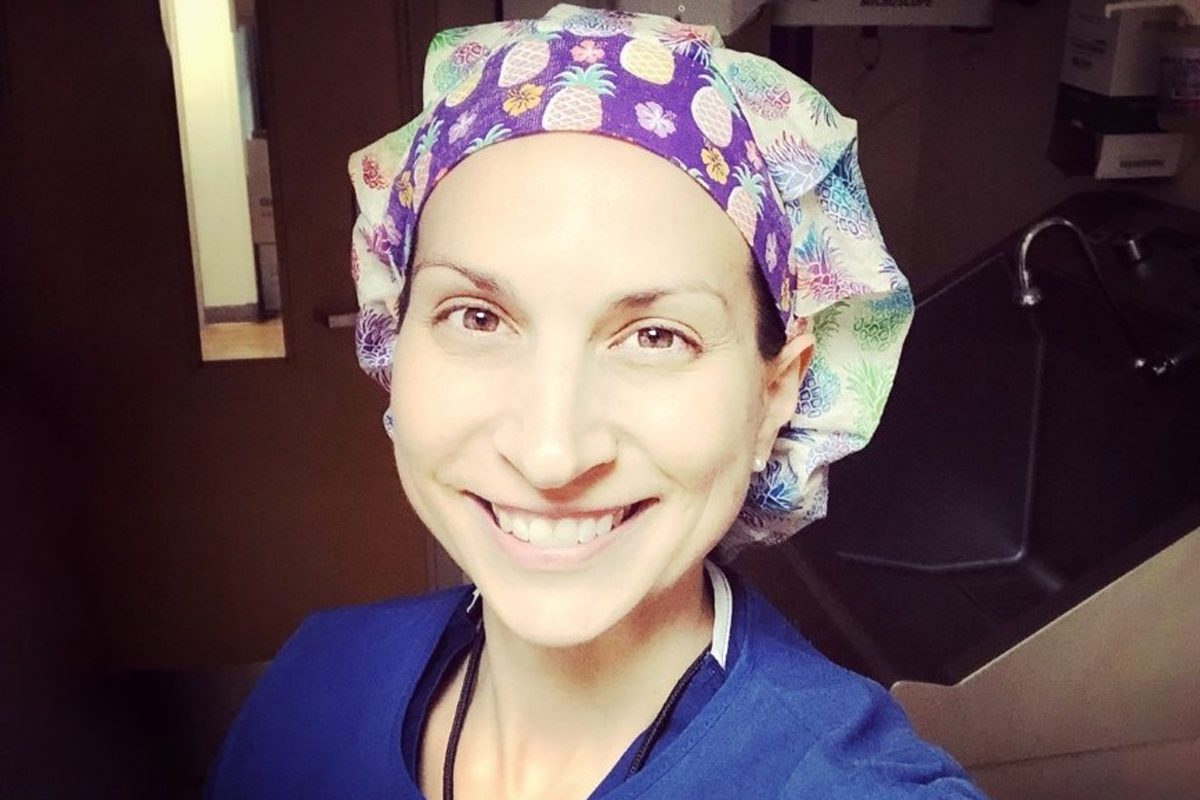Ruby Booras and Anne Judge, from The Whole Pineapple Podcast and SRM, recently met with Dr. Nichole Barker to ask her some questions about what to expect at your first visit to a fertility clinic and how best to prepare. Here’s some of the highlights from their podcast episode:
Ruby: What do you think is the hardest part for people about making that first step to schedule a new patient consultation visit?
Nichole: Sure, I always think to myself, how when I’m looking at their health history paperwork and seeing how long of a time people have been trying to conceive. It breaks my heart. It is scary to maybe find out that there could be something wrong or that you might need some help to conceive. It is also intimidating because it’s a very personal and intimate discussion, you haven’t met the provider before, and wonder how it’s going to go.
I also think that patients are worried that it’s going to be so expensive, which is a reality, and that we have to understand. But I do want to say that, for the most part, making a call or sending that message that you want to make an appointment, being vulnerable, and finding out the information is something that all the patients out there should do. You deserve that. All of this information is going to be empowering to you, it does not commit you to doing treatments, it just gives you information.
Ruby: What are the timeline guidelines for trying to conceive and seeking fertility assistance?
Nichole: The definition of infertility is technically a year of trying for those who the female partner is less than 35 years. And if you’re 35 years old or older, we say within six months. This just means that you’re at the point where you can get some information, just because we know that time might be a little bit more limited for you.
If they know they have some sort of reproductive issue, the timeline may be earlier. Sometimes I see a patient who doesn’t even get regular periods. They were told to prove that they haven’t been able to get pregnant for a year before seeing an infertility doctor. That is not true. If you do not have regular periods, if you know that you have had a tube removed or both tubes removed, or maybe had some exposure to chemotherapy, or had a testicle removed, or had hernia surgery… if you have any concern, essentially, I think it’s worth getting at least some information and having a discussion.
We’re on your side, we’re here to be on this journey with you. And although I can’t necessarily guarantee when, or what the outcome will be, and that’s super frustrating, we’re going to do our best to help support you through this as best as we can, and hopefully give you some options.
Anne: What have you found, that is the biggest anxiety for patients when they come into the office?
Nichole: I think that just being nervous about being vulnerable with their fertility provider, giving the doctor information and maybe getting back certain information that might be scary to hear. If we tell you that you have no sperm, or you have blockages of your tubes, or you have low ovarian reserve, this does not mean “I’m sorry, good luck”. At that point, it gives us a launching point to talk about, “Can we fix it? Or can we address it? Or do we have to go around it and see if there’s some options to get to your goal?” Because there’s many different ways to build families.
Transitions, a lot of people compare the fertility journey to a roller coaster, which being on my own fertility journey, I have shared similar experiences where that’s true. You can’t get away from it. You might have one hurdle and be told that everything looks normal, but that doesn’t guarantee you’re going to get pregnant. It is something that is a continual process and roller coaster of emotions and for most people.
Anne: What happens at that new patient consult?
Nichole: At this particular time, the New Patient Consult is over Zoom. You will fill out some paperwork ahead of time, submit your insurance if you have some, and you’re all set to go. At the first appointment, I have reviewed all of that and we’re just going to have a conversation. After we do our introductions, we start diving into how I can help them. Sometimes patients are having recurrent miscarriages, or sometimes it’s ‘we’ve been just trying for a year or two, and it hasn’t happened’. Sometimes I have patients coming to the clinic, and they haven’t had any testing. Then I have others where with a previous provider, they have had some testing already that are preliminary for fertility. So we review those tests too. We will talk about how long they’ve been trying, their family building goals, talk about doing some diagnostic testing. We would also, during that time, talk about where things could go wrong. The diagnostic testing is used to evaluate that.
Ruby: If we are evaluating your ovarian reserve, how do we do that?
Nichole: We can do some blood work, a pelvic ultrasound to look at the ovaries and try to count the follicles. That is a representation per month of what your ovarian reserve is. So, a pelvic ultrasound, usually is going to be a vaginal ultrasound. I do tell patients that because sometimes they’re surprised. Usually, to see these very small structures a vaginal ultrasound is the best way to kind of get to seeing that.
Ruby: Tell me more about the very common evaluation test, the HSG, what is it?
Nichole: The main piece of evaluating for the female, would be the uterus and fallopian tubes. We usually recommend a hysterosalpingogram, the acronym is HSG. Most people will call it the dye test, it is a little bit more invasive, because we do put dye into the uterus. This test is something you could usually drive to and from the clinic yourself, usually we have you eat a little something and take something for menstrual cramps. So, ibuprofen, maybe 30 minutes to a half an hour beforehand. The setup is kind of like a Pap smear, nobody’s favorite. But most of my patients have had one, then we clean off the cervix, put in a little catheter, and we’re doing an x-ray on top of your abdomen while we’re putting in dye. You usually get the results right then and there, at least at our facility. There are some people who do have a lot more discomfort, but the reality is that the test is usually less than a minute or so. But as a patient, it feels like an eternity on the table.
Anne: So, what can patients do to get the most out of their visit? Should they do testing beforehand? What paperwork, what should they do to make it worth their while?
Nichole: It is kind of nice to know, what are you worried most about? And that’s a question we put right on our paperwork, which I love, because that’s usually where patients go right to. That’s often times where they’re revealing their most, their deepest darkest worries. You don’t have to formally make a list. But in my opinion, I would, make a list and maybe say these are the main things that I want to get out of this visit with the doctor.
If you haven’t had testing yet, don’t worry about it, because we’re going to get you the testing. But I know that some patients are worried about cost. Sometimes if we’re not contracted with their insurance, and they are with their OB, or primary care, then they could do it. As long as I get the data, we can talk about it. I think that if you have that information with you, I am a huge believer, and this is just what I do personally, I like to have my own records in my hand, or on my phone or something.
Ruby: What is it that’s important for patients to disclose to us? And how are there ways around it if they want to be private about it?
Nichole: Yeah, that’s a great question. Because it is totally an individual’s right to have their own medical history not be shared, even with their partner, even if they’re married. Some things that patients have done, were to separately fill out paperwork if they’re coupled. Don’t have one partner filling out both partners’ forms, just do it separately, and sometimes I’ve had patients ask to be individually interviewed by me. Or they go to the first interview with me and let me know that they haven’t yet shared certain private information with their partner and are not sure they ever will. But it’s something that we need to know about. We do ask a lot of invasive questions. We’re going to ask, and it’s okay if you don’t want to share. But I think that if you already know that it’s something you’re uncomfortable with, you need to at least let one of us know why.
Anne: I think most places have their own EMR or some way where you can have secure communication, and that’s almost all individual. So sometimes that’s a nice way for people to send a message afterwards being like, hey, I didn’t want to talk about this there. But I think you should know, blank…
Ruby: I’ve also found that those things sometimes are areas of anxiety for patients too, they think that has something to do with why they’re struggling to get pregnant. And there could be some guilt there that once you talk it through with us, we can maybe assuage some of that, those guilty feelings.
Nichole: Absolutely, there’s a lot of in infertility in general, a lot of shame, self-shame. The reality is that infertility does not really care who, what you are, how much money you make, how tall you are, what color you are, it does not matter, it does not discriminate. There’s not much we haven’t heard of, and we are not here to judge anybody, we are here to help you get to your goals, and we want you to feel as comfortable as possible doing it. So, I think that the more open you feel, to share these things, it’s going to hopefully allow us to address those things and decrease your worries about them.
Visit The Whole Pineapple Podcast Website to find out more about Ruby, Anne, and The Whole Pineapple podcast. You can find TWPP wherever you listen to your podcasts. Be sure to listen, rate, review and subscribe! It helps them reach more listeners.




